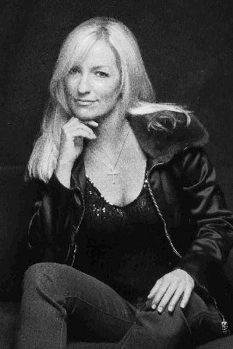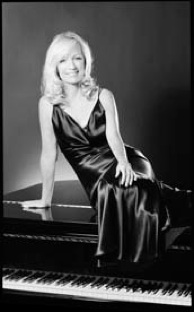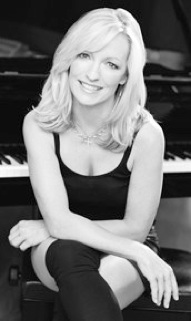Lisa Hilton is one of a very small group of female jazz pianists. I was introduced to her music several years ago when David Nevue asked me to review “Cocktails At Eight” for Whisperings Solo Piano Radio. I loved it and have reviewed several of Lisa’s other seven albums since then. When she sent me an pre-release copy of her latest CD, “Midnight in Manhattan,” I thought it was her best album yet and decided it was time to get to know this Malibu, CA-based artist a little better and do an interview. We had a delightful phone conversation in early-August, and I think you’ll enjoy getting acquainted with Lisa and her music, too.
KP: When did you start playing the piano?
LH: I started begging my mom for piano lessons when I was six, but since my two older sisters didn’t practice, she was sure I wouldn’t either. She said that if I still wanted piano lessons at eight, I could have them then. I started out with with a keyboard marker that showed me how to play by color, but I got bored with that pretty fast and started coming up with my own little songs. I always wanted to play, and once I started lessons, I learned very quickly.
I took lessons until my first year of college. I knew I didn’t want to be a classical pianist or play with a symphony, and I really didn’t think there were any other options. I didn’t have a good teacher in college, so I quit, went to art school, and became an art director. I realized after several years that I needed to change career directions, and I started looking for something else to do creatively. That’s when I started composing again. I heard David Foster, a great composer, producer, and pianist himself, play at a party, and thought, “This is it! I need to play pop music!” I had tingles up and down my spine! I went out and bought loads of pop music books. I worked my way through all of those books and found that it wasn’t the music I wanted to play. Out of complete frustration, I decided to come up with something myself. Nine years later, I’ve written about seventy-five songs and recorded eight CDs. Now I look back and think I probably should have been a composer all along, but I grew up in a small town and was never introduced to anything like that. I always seemed to be searching for music that I liked to play, and was often dissatisfied with pieces. Sometimes I’d find one little thing that I liked and would play the heck out of it. I always had very strong opinions about how classical pieces would have been better if the composers had done something differently. A few years ago, I found some old papers from a long time ago. One had the question, “What would you like to do in ten years?” I had written, “I want to compose.” I didn’t remember writing that!
KP: How long did you avoid the piano?
LH: I’m not really sure, but it was a long time. I took lessons for eleven years, and then I quit for probably longer than that. I’ve been playing again for nine or ten years. When you put the time in when you’re young, you really can get it back. I had to find a lot of little tricks that would bring my skill levels up again.
KP: What did you do?
LH: I used a metronome, and taped and listened to my music. That helped a lot. I was diligent about doing basics like scales and chromatics and that sort of thing. Now I enjoy them - they relax me and get me set up to do a good practice session.
KP: Where did you go to art school?
LH: I got my degree in Art and Design from Cal Poly in San Luis Obispo, and went to The Art Center for photography. I’m okay with having put the piano aside for so long because now, to be an adult and to be so passionate is quite a blessing. If I had played for all of those years, I might be a little bit jaded or something.
KP: Especially if you were working on things that you weren’t very excited about.
LH: It’s funny because these days I play the classics every time I sit down at the piano. Now I really appreciate what can be learned from them. To warm up, I play about an hour of classical music, and then I go into my jazz. I figure if you start with Beethoven, anything will be easier after that! Fortunately, I had a good piano education in that I studied modern piano literature, too. At a very young age, I was working on challenging and dissonant pieces. I think about what wonderful experience that was for a jazz composer, learning music that is so harmonically out there at a young age. Now I can see parallels. I did a Miles Davis piece called “So What” on the last album that feels very similar to a Kabalevsky piece I did when I was about thirteen. That kind of piano background really helps.
KP: Has it been difficult being a female jazz artist? It seems like jazz is so male-dominated except for singers.
LH: Yes! Why do you think that’s so?
KP: I have no clue - that’s why I’m asking you! {laugh}
LH: Every time I look at a radio chart, I see that the female artists make up only two to twenty percent of the chart - no matter which chart you look at. I know that there are plenty of women who are studying instruments and jazz, so I have no idea why the percentage is so small. After all, jazz is supposed to be about freedom! If you’re a woman in jazz, it’s kind of assumed that you’re a vocalist. I really think that the piano is my voice. As listeners, most people really like a uniqueness of sound, and if most of the successful jazz artists are male, then I will sound unique! So, I don’t worry about that. If you know strongly in your heart where you’re going and what it is you’re going to accomplish, you can’t get distracted by what’s going on elsewhere. I have plenty of supporters, fans, and listeners, so I focus on that. Jazz can be a tough road, but I’m still surprised there aren’t more women on the charts. Perhaps there will be in the future - maybe I can help change that.
KP: You do pretty much everything yourself regarding your career, don’t you?
LH: You know, I never set out to be a producer, a label head, or a promoter, but it just kind of presented itself, and that’s what I have to do. I enjoy the business part, although I would like to do a little less of it. When you start making it on the charts, it’s fun. You feel like you’re winning. I enjoy being a producer very much - it reminds me of being an art director. In fact, I think women are very well-suited to being producers, but there aren’t very many in the field. Taking raw materials and making the best of them is something that comes easily to a lot of women. Producing is something I enjoy a lot - all aspects of it.
KP: What exactly does a producer do?
LH: Music producers make all of the arrangements - the time, the people, the studio, the budgets. They decide on the mood and ambiance of the music and how they want it recorded, present the music to the players, and choose who is going to play. Afterwards, they work on the editing, mixing, mastering, and manufacturing - all that stuff.
KP: Pretty much everything but the actual performing.
LH: I’m not an engineer, so I hire the people for the sound that I want. You try to get the best people to work on the job. I can call the best sax player and the best engineer and get them here! How great is that? The three days I spend in the studio are my best days of the year. I would love to do it more!
KP: Have each of your albums gotten more and more successful?
LH: It’s a very funny thing - or at least I think it’s funny. My first album was finished at the end of 1997, and I thought that if it wasn’t successful, I’d die or something. Of course, nothing happened to it. I think I sold two copies, and none of it was played on the radio. With each album, I would hope for success, but now that my music is played around the world and is reaching people, the early albums are selling! We’re going to reprint the first one, and the second and third albums are doing well now, too. It’s a very sweet feeling that my first CD that I had given up on is doing well now. The title track from that album, “Seduction,” was played more than 4,000 times on the internet last quarter! I think that Whisperings Solo Piano Radio has helped to a great extent to revive instrumental music and piano music. Also, with so much being available on the Internet, people have more choices about what they listen to and can find more music easily.
KP: How many of your albums are solo piano?
LH: I have two that are solo - “Seduction” and “Playing By Heart.” On “Cocktails at 8,” I experimented with putting a trio on three songs. With each album, I’ve done something a little different, and each album has been quite challenging. I wonder if there will be a time when I go into the studio and it’s easy. The first time I ever recorded, it was so difficult that I came home with a big stomach ache.
KP: I’m sure it’s very stressful!
LH: Because I love it so much, I want everything to be perfect. Now I don’t worry about it as much, but it can add extra pressure at times. With “Feeling Good,” my fourth album, I added some guitar and some combo stuff. With “In the Mood for Jazz,” I added sax for the first time. For my most recent album, “Midnight In Manhattan,” I listened to people who said they wanted to hear more piano and only put the sax on three songs. I’m getting a very good response from this CD.
KP: I think you found the perfect balance. The piano is at the forefront of all of the songs, but it’s still an ensemble album.
LH: When you feel you aren’t as successful as you should be, you try different things. People like standards, so, with “My Favorite Things,” I decided to record everyone’s favorite standards, but then the critics said they wanted to hear more of my compositions and more piano, so for the new one, I decided to focus on what I wanted to do musically. It’s going over very well, so that’s nice.
KP: Do you have any idea of why it’s so hard to get radio airplay for solo piano, other than on Whisperings?
LH: I think that listeners demand a bigger sound. Broadcasters have to answer to the advertisers, so they have to come up with a format that will attract advertisers as well as listeners. Unfortunately, solo piano hasn’t done that. I would love to change that!
KP: It doesn’t make sense because I love listening to piano music in the car.
LH: People in radio say they can’t play solo piano, so I’ve done ensemble recordings, but I’m going to keep the music as honest, as clean, and as natural as I can. I would like to prove that instrumental music can be wildly successful and still be relaxing and have the purity of the original instruments - not keyboards and synth samples. I know there is a market for it. I really appreciated when Solo Piano Radio got in touch with me. It was so cool!
KP: David Nevue is a genius.
LH: He’s the piano savior! Now when I record, I always make sure there are at least a couple of solo piano pieces for him and the piano station on DMX. I want to support that!
KP: Do you feel that any of your songs are your signature pieces?
LH: I have always thought of “Seduction” as kind of my signature piece, but I’m not really sure if everybody likes that song.
KP: I sure do! You’ve had that on two or three albums, haven’t you?
LH: With a really good song, you keep going back to it and you keep changing and working with it. When I play other composers’ music that I love, I keep going back to it and it keeps growing. You can play a great composition for years, and you see more in it, you grow with it, it changes. That has also happened with “Seduction.” It’s a difficult piece to play and is still challenging me, but I’m sticking with it because it’s still evolving and it’s fun! Every time I sit down to play, I play “Seduction.” I’m still trying to get it right.
KP: How do you practice, and how often do you practice?
LH: I never say that I practice - I only say that I play. I would love to play as much as possible, but I think that what works best for me is to play every other day. I can have a work day and a play day. I like to start with technical stuff like scales, then I play classical music - Bach, Beethoven, Chopin, and Mozart - and then I move on to the jazz. If I have a new song I’m composing, I can’t wait to get to it, but I make myself wait until I do my scales and the warm-ups. I really try to approach the piano in terms of how you would speak or sing something. I think of all the little details and nuances - staccato or whatever is indicated. We don’t always think they mean that much, but they mean the world. All the very tiny details are how the expression is created. I listen a lot. I tape myself when I’m playing a piece and then I listen to it, and then play it again. I have times when I just sit and listen. I’m really into all my little details.
KP: When you have a practice session, do you have a set time?
LH: I usually play for four hours. I really like to spend an hour on warm-ups before moving on to other things. Any time I sit down, I feel like I could compose something, but I have to tell myself, “No, I’m not composing, I’m playing today.” I tell myself what my goal is for the day - to memorize a piece or to work on performance repertoire, something like that. It’s fun when I say “I can compose!” I always start composing the music for a new album as soon as I’ve finished recording in the studio.
KP: Do you find that you compose all the time?
LH: Yes. The summertime seems like a better time for me because I love the warm weather, everyone seems to be happier and more relaxed, and things seem to be especially fun. Summer always tends to be a good time to write, but I wrote quite a bit of the latest album in January. It’s always something that I can do, that I can rely on. I think composing ia new song is like a new relationship where you’re falling in love and you just can’t wait to spend more time!
KP: Let’s talk a little bit about “Midnight in Manhattan,” your new album.
LH: I spend a lot of time before each album thinking about what the general goal is. I can compose in pretty much any kind of direction, but I thought on this one that I wanted to put in more piano and more of my own pieces, and I also wanted to embrace what I do that is more unique to me. One of the more unusual things that I do is kind of a bluesy sound. I wanted to bring that into my work more. It’s what people call “sultry” or “slinky.”
KP: I think those are my favorite pieces of yours. I love blues!
LH: I do, too! I think you’re probably doing your best when you’re embracing what’s unique to you. The positive response I’ve gotten is so fulfilling because I really felt I was sticking my neck out and exploring some areas that I wasn’t sure would go over well.
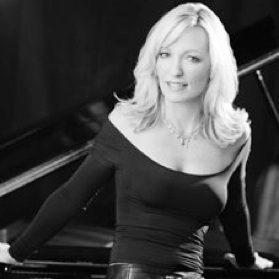
Whenever I do an album, I try to create moods that are memorable, kind of like a movie soundtrack that has a theme going through it, but also brings in different moods. I always have something upbeat and lively that I would want to dance to, and then something moody or thoughtful like “Late Night.” I was really pleased with how “Over the Rainbow” came out. That was a piece I wanted to do a long time ago, but I just couldn’t find a good direction. It’s a really great piece, but it’s hard to add something of your own to it. When I do an arrangement, it’s like solving a puzzle - trying to find a new approach that is valid and upholds the integrity of the original piece. My memory is from childhood seeing Judy Garland singing that song, so I tried to create the feeling of extreme longing that she had as the character of Dorothy. It went from longing to anger to outright blues to wistfulness, and I tried to create all those different contrasts in mood within the same piece. Those mood changes reflect how we really think - or at least I do - moving from one thing to the next.
KP: One of the pieces on the CD is called “Midnight In Manhattan,” but did you give the album that title because New York is a jazz center?
LH: Album titles are always the hardest part. When I named that song, people really liked the title because it conjured up a picture. A friend suggested that I name the album “Midnight In Manhattan.” It is very moody and expressive, and New York is the jazz capital. I try to have titles that are suggestive or evocative.
KP: Have you done any music distribution in Asian countries?
LH: I’ve had some interest from Asia. I think that might be a good market for me.
KP: It seems to be a great market for piano music. I’ve heard from various artists that it’s just amazing because the concerts are held in big performing arts centers, and people are lined around the block to get in.
LH: I would LOVE that! I had one guy recently make a remark that I was born two hundred years late as a pianist.
KP: {laughing} That’s a problem!
LH: That’s kind of how pianists rate in this country.
KP: Yep, always at the bottom of the priority list.
LH: Well, it’s been a world of joy for me. When you actually delve into an instrument or whatever your interest might be, it’s like the universe expands. It’s making me want to play, just talking about it!
KP: You said you wanted to talk about hand position. Do you do something that’s different?
LH: I feel very firmly that there is not one correct hand position.
KP: I agree with that.
LH: Okay! So many teachers are very inflexible about hand position, but I had one great teacher who did the opposite. Now I always look at other pianists’ hand position and I think about it, but I believe you should use whatever hand position you need for the piece.
KP: Whatever works. I’ve watched videos of Glenn Gould, Horowitz, and some of the other classical masters, and they often played flat-handed.
LH: Thelonius Monk was known for a flat, kind of a splayed hand. I do think, generally, that a flat hand approach is a good one, but if you’re playing quickly or you’re doing a trill, you have to curve your fingers. If you want the music to sound caressing, you caress the keys. If you’re playing fast and furious, the hand position will follow that. When I see how some kids are being taught, my reaction is “How can you teach that?”
KP: I think that’s a really big problem. Too many teachers go by the book - that’s the way it’s always been done, that’s the way it will always be, and there is no flexibility. I’ve found, and this is why I don’t belong to any teaching organizations, that it’s such a novelty to let students pick what they want to play. If you’re playing something that you like, you’re going to play it more often and with more enthusiasm, but too many teachers insist on going straight through the lesson books. No wonder so many people quit!
LH: I quit because of my teacher in college. My playing is very expressive, and my teacher said, “No, no, no. That’s not how Bach would have played it.” I thought, “Why should we care how a guy who has been dead for a couple of hundred years would have played it?” It’s an art and it’s your own expression that you bring to it. That’s what is important. That teacher was pretty much the guy who caused me to quit. About a zillion years later, I was in the studio with my editing engineer, and it turned out we had the same piano teacher, and that’s why he quit, too! He’s a very good engineer because he’s a good pianist, and I’ve become a composer, so that teacher has quite a claim to fame! When I was growing up, it felt like there were no avenues if you loved music and wanted to play an instrument. Now there are a lot of options that I know about, and I hope that students who are interested in music will discover that there are many different things that they can do. They can become engineers or producers or any number of things. The number of performing careers is pretty small, and it’s a unique kind of person who would follow a career path like that. When I was growing up, you either taught or played with the symphony or something like that. I didn’t even think about composing.
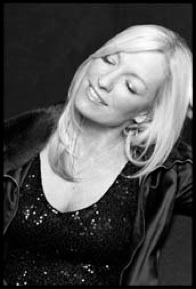
KP: Everything happens for a reason, and it sounds like it has worked out for the better, but I’m sure the period when you didn’t have a piano was kind of miserable.
LH: Sometimes I would steal over to a piano store and play there, but it was like giving up my true love. Like I said, now I have more passion than perhaps I would have had.
KP: I’ve read that you’ve gotten involved with some of the schools that teach students with various challenges and disabilities.
LH: I think because I did lose my way musically, I have a strong urge to help young kids who are trying to find a musical direction. As you know, there isn’t much music being taught in the schools, and there isn’t much direction given in families these days for lessons - it’s an afterthought sometimes. I don’t know why, but I really enjoy performing for the visually impaired and the blind. I’ve done a bit of that at the Camp for the Junior Blind in Malibu, and I’ve gone back to Boston to the Perkins
School For the Blind, where Helen Keller went. It’s about 177 years old and a very well-established institution. Many of the kids there are multi-handicapped. I performed there last year and did a master class. I’ll go back again in January. Music has meant so much to my life, and I think that perhaps if I didn’t have my sight, it might mean even more. It might even save a life.
KP: What’s up next for you?
LH: When you release a new album, you don’t see too far in front of you. I would like to do sheet music this fall - I have promised my fans. I’m working toward the next album. Musically, I would like to create music that even transcends the instrument - that creates such a mood that you can’t even really tell that it’s a piano. I have my business goals, my piano goals, and my compositional goals. I’d like to get more involved with some children’s programs. I’d like to play like an angel - that’s at the top of the list!
KP: How often do you perform?
LH: Not enough, but I wouldn’t be surprised if I started doing solo shows now, too - not just performing with the band. I felt I needed to work within the system and add a band until I got established, but now that my name is well-known, perhaps I’ll go back to more solo shows. It’s actually more fun playing with the band, though. There are all of the interactions, and it takes the emphasis off of you. When it’s just you, it’s just YOU. When you’re playing with someone else, you don’t have to think about yourself. You think about how to work with them. If you can share something with someone, it’s more fun!
KP: Anything else?
LH: I just hope there is some way that I can inspire kids to stay with the piano, to not give up like I did, and that if they want to become pianists, it’s a hard task, but it doesn’t really matter because it’s what you love more than anything else. It’s my own true love!
Many thanks to Lisa Hilton for taking the time to talk to us about her life and her music! To learn more about Lisa and to hear samples of her music, visit
her website and check out her
Artist Page here on MainlyPiano.com.
Kathy Parsons
April 2006

